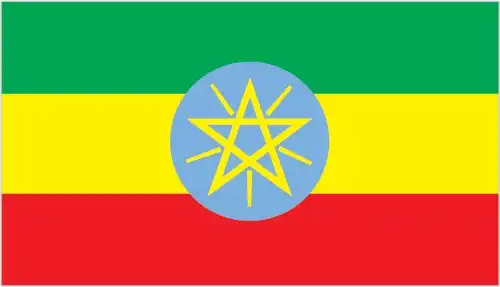Ethiopia Flag
National Flag of Ethiopia
Ethiopia Flag Display

Quick Facts About Ethiopia and Ethiopia Flag
- Adopted:
- Aspect Ratio:
- 1:2
- Capital:
- Addis Ababa
- Population:
- 118.5 million
Flag Description
The flag of Ethiopia features three horizontal bands of green, yellow, and red, with the national emblem (a blue circle with a yellow star and rays) in the center. The green represents the land and hope, the yellow symbolizes peace and harmony, the red represents the blood shed for independence, and the emblem represents the unity of Ethiopia's diverse peoples and the bright future of the nation.
Symbolism & Meaning of the Ethiopia Flag
Green for land and hope, yellow for peace and harmony, red for blood shed for independence, emblem for unity and bright future.
Historical Background of the Ethiopia Flag
Adopted in 1996, the flag is based on the traditional Ethiopian colors that have been used for centuries. The emblem was added to represent the country's diversity and its aspirations for unity and development. The colors have influenced many other African flags.
Design Elements of the Ethiopia Flag
Three horizontal bands (green-yellow-red), national emblem (blue circle with yellow star and rays) in center.
Usage & Protocol of the Ethiopia Flag
Flown daily on government buildings and schools. Displayed during national holidays and official ceremonies. The flag is raised at sunrise and lowered at sunset. When displayed with other flags, the Ethiopian flag takes precedence. Must be properly illuminated when flown at night and should never touch the ground.
Frequently Asked Questions
What do the colors of the Ethiopia Flag represent?
Green for land and hope, yellow for peace and harmony, red for blood shed for independence, emblem for unity and bright future.
When was the Ethiopia Flag adopted?
The Ethiopia flag was adopted on 1996, marking an important milestone in the country's development as an independent nation.
What is the aspect ratio of the Ethiopia Flag?
The Ethiopia flag has an aspect ratio of 1:2, which determines the proportional relationship between its width and height for official display purposes.